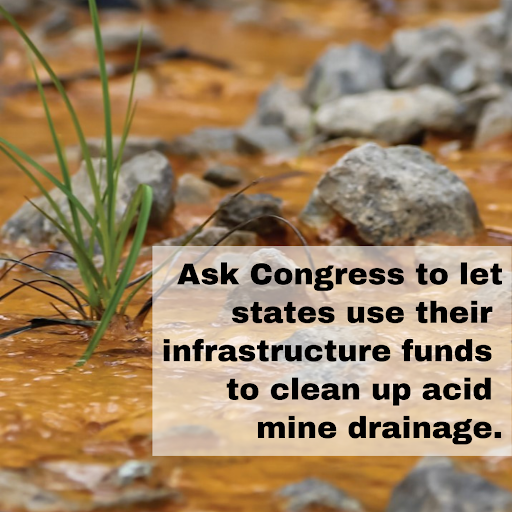Front Porch Blog
By Trey Pollard
 Acid mine drainage (AMD) is one of the most pervasive and visible problems caused by abandoned mine operations in the country. In many communities that relied on the coal industry, coal mines that have often been shuttered for decades are still polluting streams, rivers, creeks and lakes, turning them red or orange due to a chemical reaction that creates acid mine drainage. It’s not just an eyesore – it contributes to making the places millions of people call home less healthy, less safe, and less inviting for residents and businesses.
Acid mine drainage (AMD) is one of the most pervasive and visible problems caused by abandoned mine operations in the country. In many communities that relied on the coal industry, coal mines that have often been shuttered for decades are still polluting streams, rivers, creeks and lakes, turning them red or orange due to a chemical reaction that creates acid mine drainage. It’s not just an eyesore – it contributes to making the places millions of people call home less healthy, less safe, and less inviting for residents and businesses.
AMD has been a well-documented problem for decades – and people in the communities that have been impacted are fighting hard to clean it up. Appalachian Voices previously hosted a blog and video series produced by mine reclamation advocates highlighting the acid mine drainage crisis and several local leaders who are working tirelessly to address it.
DJ Coker in northeastern Tennessee discovered an acid mine drainage site near his home and now advocates for policy changes and accountability. Marissa Lautzenheiser of Rural Action is leading clean-up efforts and helping turn acid mine drainage problems into opportunities in Appalachian Ohio. And Amanda Pitzer in West Virginia runs Friends of the Cheat, an organization committed to protecting the Cheat River by developing and deploying innovative clean-up systems. We encourage you to check out the profiles of each of these leaders to learn more about how acid mine drainage is harming their communities and what they decided to do about it.
Take action!
Ask your legislators to make sure states and tribes can spend their abandoned mine land cleanup funding on long-term treatment of acid mine drainage.
Also featured in that blog series is an interview with Joe Pizarchik, the former director of the Office of Surface Mining Reclamation and Enforcement. In that interview, Pizarchik highlights some of the challenges to funding acid mine drainage clean-up and lays out what Congress can do to overcome some of these hurdles. With $11.3 billion in federal investments from the bipartisan infrastructure act headed to coal communities to clean up abandoned mine lands, Pizarchik identified a major concern: waters polluted by acid mine drainage may not be eligible for clean-up funding due to a misalignment with how funds can currently be used.
Acid mine drainage never goes away, so there is no quick fix. It requires ongoing water treatment. That’s why the current Abandoned Mine Lands (AML) program allows states to set aside 30% of AML funding each year into accounts that accrue interest and can cover these perpetual costs. But, when the infrastructure bill and its sizable AML investments were passed last year, it did not include a similar provision.
The good news is that help may be on the way.
There is growing momentum in Congress right now to ensure states can use these infrastructure investments for AMD clean up. In fact, Senator Bob Casey of Pennsylvania has indicated he is working to include language that would ensure these funds can be used to clean up AMD in appropriations legislation for Fiscal Year 2022.
This would be monumental. Not only would this change not cost any additional money, it would give communities struggling with polluted water a clear path forward to a solution. But, we don’t have any time to waste. The deadline for this change to be made is just days from now – there needs to be a showing of bipartisan support for Senator Casey’s efforts this week.
That’s why we are asking people like you to take action and tell Congress to clean up orange water by removing red tape. Join the efforts of community leaders across the country and tell Congress to let states use their infrastructure funding for acid mine drainage treatment! Click here to get started – and thank you for your support of this critically important change.
PREVIOUS
NEXT
Related News

Leave a comment
Your email address will not be published. Required fields are marked *
